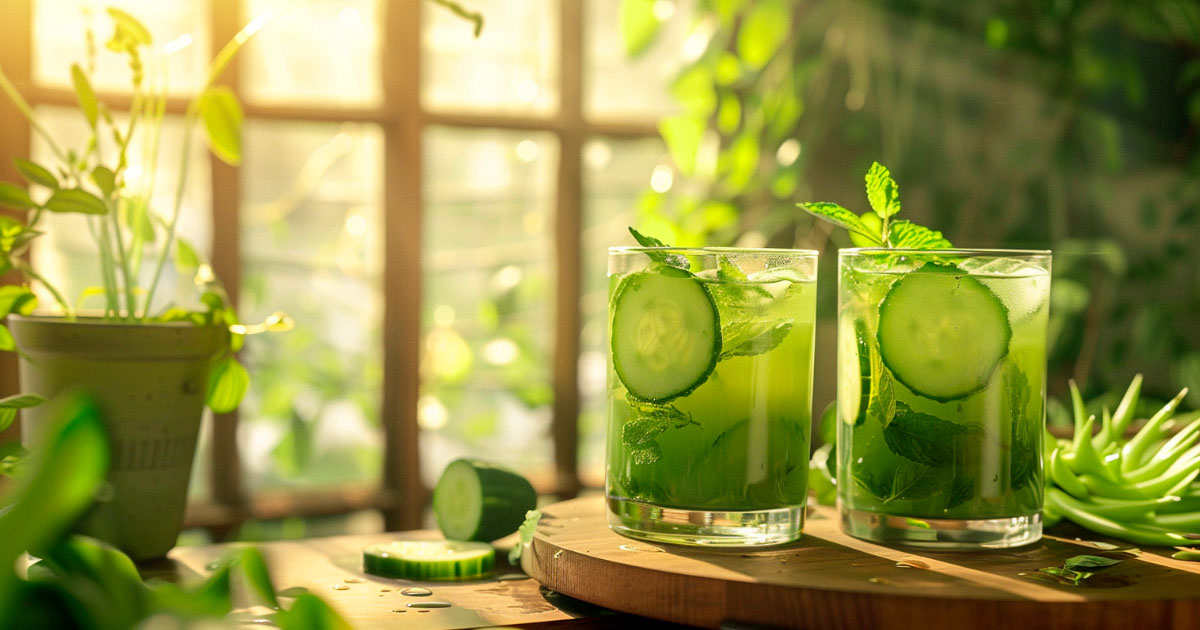
Though generally thought of as a veggie, the cucumber (Cucumis sativus) is actually the fruit of a type of creeping vine. This family of vines, Cucurbitaceae, also includes fruits like squash, pumpkin, zucchini, and watermelon. Like other fruits in the family, cucumbers are known for high water content and having a mild, fresh flavor. In addition to its hydrating properties, though, cucumbers are also rich in a number of vitamins and minerals that provide a whole host of potential health benefits.
Cucumbers have been widely cultivated for thousands of years, with the earliest evidence of domestication coming from India; today China produces the vast majority of the world’s fresh cucumbers. There are three main types of cucumber that are differentiated by their culinary use: slicing, pickling, and seedless/burpless. A significant portion of cucumbers around the world are used for pickling, but they can also have their juice extracted for other culinary and health product purposes.
Cucumber juice is derived from the watery flesh of cucumbers, and it is often used as a beverage that provides hydration and electrolytes. Because of the high water content and low calories, it is a familiar choice in health food contexts. Just as eating cucumbers can be beneficial for overall health and wellness, so can drinking cucumber juice or cucumber water (slices of raw cucumber soaked in water). The flavor of the juice is sometimes paired with other flavors like lemon juice, ginger, or mint.
Overall, cucumbers are a nutritious addition to a balanced diet that provides hydration as well as vitamins, minerals, and phytochemicals. In part because cucumbers are over 90% water, they are a great, low-calorie source of nutrients. An average serving of fresh cucumber has only 16 calories, 3 grams of carbs, 0.65 grams of protein and almost no fat. Below are some concentrations of essential nutrients:
Aside from being a refreshing drink and an ingredient in smoothies, sports drinks, cocktails, salad dressings, and soups, cucumber juice also contains valuable antioxidants. Antioxidants, found in flavonoids, carotene, and other essential nutrients, are powerful compounds that protect our body’s cells from oxidative stress. Oxidative stress is a state of being that can result from too many free radicals in the body, but antioxidants can absorb free radicals. Along with the numerous vitamins and minerals, the nutrients in cucumbers can provide a wide range of health benefits:
While cucumber juice is generally safe to consume for most people, some individuals may experience certain side effects or adverse reactions. For instance, a small percentage of people can have an allergic reaction to members of the Cucurbitaceae family that includes itching, swelling, or hives. Additionally, some people naturally have trouble digesting the fruit or the juice, which can cause gastrointestinal symptoms. As with most foods, however, consuming cucumber juice in moderation will lessen any potential side effects.
Cucumber juice is a versatile ingredient that can be used in a wide variety of applications, from hard seltzers and other beverages to cosmetics and lotions. At FruitSmart, we’re proud of the high quality ingredients we provide, but we’re also passionate about partnering with our clients to develop exciting new products. If you’d like to learn more about working with FruitSmart or any of our premium juices, concentrates, and essences, please contact us today to speak with our friendly staff.
